There’s no doubt about it: we’re living in a digital era. Those on the property hunt — whether for a comfortable new home or sleek office space — will start their journey online. In fact, a study by the National Association of REALTORS® found that 96% of all buyers used online tools in the search process. Wow!
Impressions are made even before a potential client meets your practitioners, steps into your office, or calls you on the phone. So, having a compelling real estate website isn't just nice to have — it's essential. It's a dynamic tool that showcases not only your properties but also the value, expertise, and unique personality of your brand. It’s where relationships start, trust is built, and deals begin to take shape.
But, where do you start? Navigating the real estate website process can feel like trying to find a property without an address. There’s a lot to think about (and plenty you might not have even considered). That’s where this guide comes into play. Before you panic, you’ll find it has everything you need to understand, create, and make the most of your real estate website.
What you will learn:
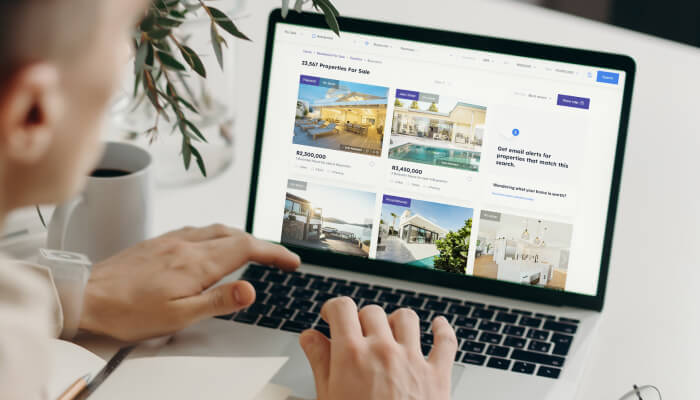
A website is simply a collection of files that can be accessed through the internet. Diving deeper, a website for a real estate agency or brokerage specifically houses all the content and tools to help your clients buy, sell, rent, or let property. It can be tailored to meet your needs, whether you specialise in residential, commercial, industrial, retail, holiday lettings, or other specific types of real estate.
Back in the day (and we’re giving away our age here), this type of website was little more than an online brochure. Today, it’s so much more! Here are some common features you’ll find:
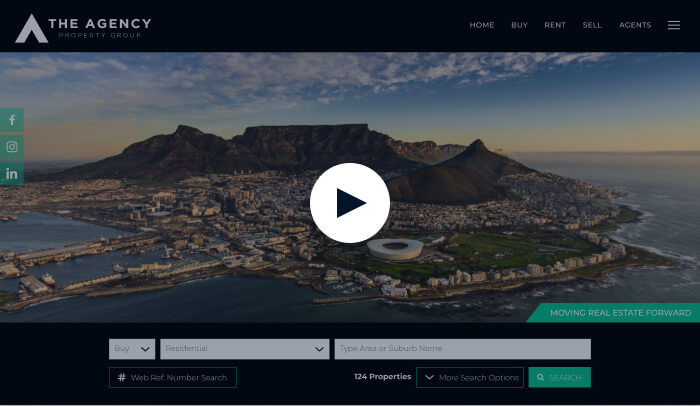
As you can see, your website is more than just a digital business card. It covers a lot of important information and features that can impact your success. Whether you’re building a website for the first time or revamping your current design, put in the effort and you’re sure to get all the benefits that come with the platform.
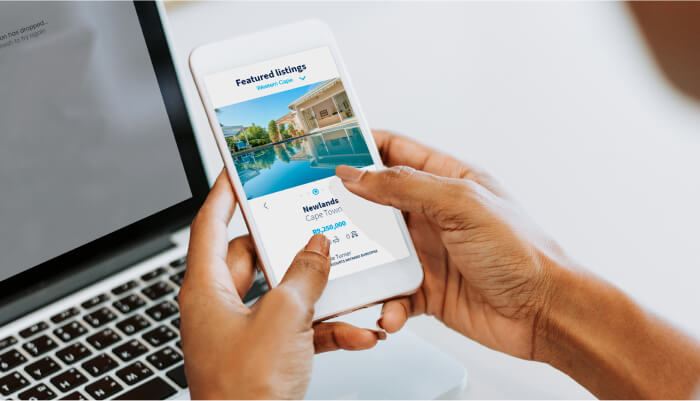
Technology has changed the way real estate transactions take place. With more buyers, renters, sellers, and landlords finding services online, a website is an essential platform to make the connection. Without one, another agency or brokerage could be beating you to the punch. Here are some powerful benefits of having a real estate website:
Establish your online presence: As mentioned earlier, most property seekers begin their search online. A real estate website ensures you have a presence when they look for properties or real estate services, whether they’re searching on their desktops or mobile phone devices.
Boost your credibility: A well-designed, informative, and useful website reinforces your expertise, setting you apart as a trusted real estate professional. Besides appealing to potential clients, your website is also vital for recruiting real estate professionals for your team.
Offer 24/7 accessibility: You’re not always available, but your website is. It allows clients to delve into property information or contact you anytime, even outside standard business hours. With a chatbot, you can even have a website sales consultant working around the clock to nurture and generate leads.
Use cost-effective marketing: A website highlights properties on your website, often costs less than traditional advertising, and is easily updatable. After the initial design and development, your primary expense is only hosting.
Provide targeted property searches: It lets potential buyers filter and find properties based on their preferences, making their search streamlined and user-friendly.
Generate leads effortlessly: The integrated contact forms on your site mean potential clients can reach out to you directly, offering a steady stream of leads.
Engage with interactive tools: Calculators, virtual tours, and maps, for example, enhance user experiences and assist in their decision-making.
Position yourself as an authority: By sharing insightful blogs, area profiles, and guides on your website, you can demonstrate your industry knowledge. Hosting valuable content also saves clients time and effort to find out what they need to know.
Leverage paid advertising: Your website holds all your content in one place, making it easy for both you and your visitors to share your content on social platforms and search engines, expanding your reach and online engagement.
Showcase feedback and reviews: Your website can let testimonials from satisfied clients speak for you, enhancing trust and attracting more potential clients.
Cater to a tech-savvy audience: With so many potential real estate clients starting their search online, having a real estate website ensures you have an avenue for them to engage with your listings and services.
Reach a global audience: With a website, the world is your oyster! It breaks down geographical barriers and presents your properties to an international audience, potentially attracting buyers from all over the world.
Gain insightful analytics: You can monitor user behaviour, popular listings, and more, refining both your online and offline offerings and marketing approach based on these insights.
Just about every business has a website. In real estate, the benefits can work wonders in attracting leads, closing sales, and building your brand. Don’t waste time to claim your space online and showcase exactly what you have to offer.
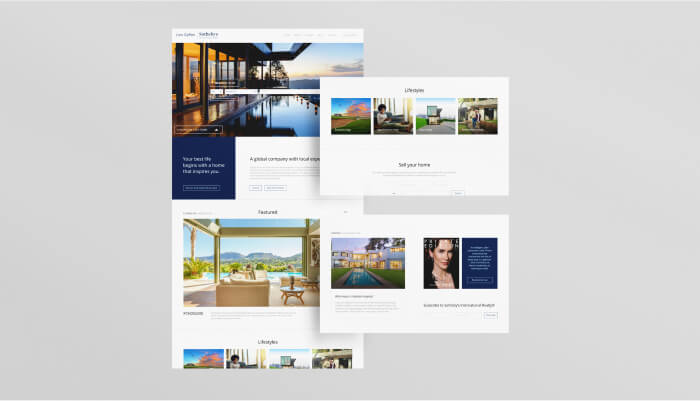
If you’ve browsed a real estate website, it can almost feel like magic. Listings get added and removed, interactive maps guide potential buyers, and virtual tours allow visitors to explore homes from anywhere in the world. A good website can make finding a property or seeking a real estate service effortless. And to get there, there's a fascinating blend of design, development, and continuous updates that ensures everything runs smoothly.
Getting your website launched:
At the very start, you’ll work with a proptech, marketing, or design company to put your website together. Whether you choose a templated or custom website, this will run through a design process. A good website design will keep aesthetics and user experience in mind to ensure your site is visually appealing, intuitive, and aligns with your brand's identity.
Once you're satisfied with the design, it's time for development. This is the construction phase where the visual plans turn into a functional website catering to desktop and mobile viewing. During this phase, developers write code to ensure every element, from buttons to forms, functions seamlessly. It's all about functionality and making sure users can navigate easily. This is an important step whether you’re creating a simple website for your real estate agency or brokerage or something more complex.
After designing and developing comes hosting. Your website needs a place to "live" on the internet, and that's where hosting comes in. You'll need to choose a hosting provider and plan that can store your website's files and data. It's like renting a spot on the internet where your website can reside and be accessed by visitors.
Now, a website isn't just about design and function. The content you place on it is crucial. This involves adding listings and sourcing or creating images, videos, and any other materials that provide value to your visitors. Your content should be relevant, engaging, and resonate with your target audience.
Once your website is launched:
Your website is live and up for the whole world to see. Great! Depending on your website’s design functionality, website visitors will be able to perform a number of functions related to their goals:
The content management system (CMS) you choose will play a significant role in your site's success. This software helps you create, manage, and modify content on your website without the need for technical knowledge. You and your team can use this system to add, edit, or remove listings, practitioner profiles, branches, website pages, blog articles, area profiles, and other content on your website. Any leads that come through from your website will also be housed and managed on your CMS.
To help you monitor your website’s performance, you should have access to analytics tools to track user behaviour, sources of traffic, popular listings, and other crucial data. This information helps in refining marketing strategies and improving user experience. You can also invest in search engine optimisation (SEO) to improve your website’s performance on search organically. Paid advertising will also be important to attract relevant traffic to your website from search engines and social media platforms.
Finally, just like any valuable asset, your website needs regular maintenance. This ensures it continues to function properly, remains secure, and provides the best experience for users. Regular updates, security checks, and performance optimisations are all a part of maintaining a healthy website.
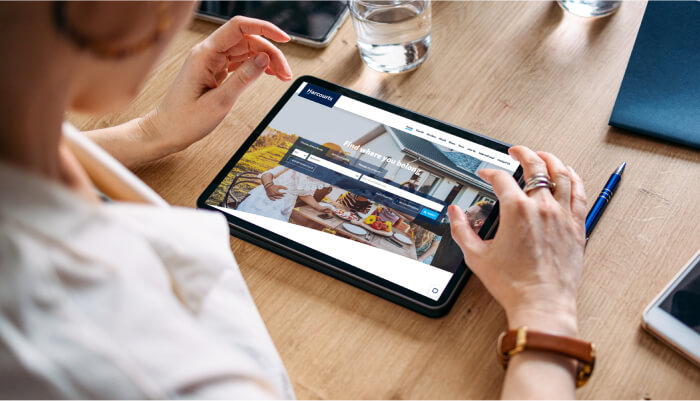
It takes just seven seconds to make a first impression, but the sense a potential real estate client gets can last a lifetime. That’s why having a quality website will serve you well. As they’re often the first points of contact people have with your business, they should go the extra mile to impress. While all are different, the top real estate websites share some common characteristics that help them attract, engage, and close.
Clear objective: Your website should match user intent and have a clear purpose that ensures they meet their goals. Doing research, knowing your target audience’s personas, and making every part helpful will deliver a website that drives action.
User-friendly interface: Your website should be easy to navigate, functional, and designed to help your clients find the properties, content, or contact information they need. From the moment website visitors reach your home page, they should know what to do. Never make them work for it or they’ll get frustrated and leave your website.
Stunning visuals: Good websites have high-quality property photos, 360-degree virtual tours, and even drone shots. A picture is worth a thousand words, especially in real estate.
Well-written copy: Persuasive and relevant copy can address your client’s pain points, highlight your solutions, and tell your brand’s story. Good copy will build trust, authority, and credibility so put this task in the hands of a skilled writer.
Quick page load time: Your website visitors have little patience. They want to see properties or find out about your services without waiting. Working on your load speed will boost user experience, decrease your bounce rate, and have a positive impact on your search rankings.
Responsive design: Many potential clients browse on the go. Ensure your site looks and functions seamlessly on different devices (laptops, smartphones, and tablets) and caters to different browsers. With many users actively searching on mobile, ensure your website can change its layout and options to match the experience on desktop.
Safe to browse: A secure website provides peace of mind for your visitors. This can include using a valid and updated SSL certificate and reputable hosting.
Interactive tools: Your website should offer visitors avenues to tick off their to-do lists. From powerful search bars, calculators, property listing forms, maps, to live chat support, these can make their experience a breeze.
Quality content: Visitors come to your site in search of answers. By sharing informative listings, area profiles, news articles, market trends, and other helpful information, you can win them over and even have them return to your website.
Social proof: Let satisfied clients do the talking by displaying their reviews and testimonials. You can also include your partner badges and affiliations to further solidify your trust and authority in the industry.
Contact information: Your audience should never have to hunt you down. All contact numbers, email addresses, and business locations should be clearly displayed on your website. You should also offer multiple points of contact such as forms, newsletter sign-ups, or property email alerts to nurture a stronger connection between you and your clients.
Optimised for search: Make sure potential clients find you first by optimising your site content for search engines to boost your visibility.
Putting together a website for your real estate agency or brokerage is a challenging but exciting journey. However, by understanding these characteristics, you’ll know just how to create one that fulfils your client's needs. They’re all tailored to offer value and build trust that you can leverage to your advantage.

You’ve decided to claim your space online and create a website for your real estate business. Fantastic! On your search, you may encounter quite a few website builders and services that offer a platform at zero cost. It sounds tempting and who doesn’t love a freebie? However, before you give them your time, there are some considerations to bear in mind.
Do they meet your objectives?
If you're looking to merely establish a basic online presence or run a personal blog, a free website might serve your purpose. However, if you're aiming for a more professional or commercial presence, free might not be the way to go.
Do these services cover your bandwidth needs?
Free websites generally allow a certain number of users to browse your website within a given time period. This might be fine if you’re just starting out. But, if your real estate business grows, you may struggle as your website traffic increases.
Will your website load quickly?
Because free website providers host hundreds of websites on the same server, this can make all these websites load at a snail's pace. Not only does it create a sour experience for your website visitors, but it also impacts your SEO performance.
Do you require special customisations?
Free real estate websites often come with limitations. You might not be able to access certain features or customise your site as extensively as you'd like. Think about features like syndication, email alerts, newsletters, reports, and mobile responsiveness — in the long run, will not having these hinder your goals as your business grows?
Are you fine with advertising on your website?
Many free websites sustain themselves by running ads on your site. Not only can this detract from the user experience, but it can make your website feel less trustworthy. You don't get a say in what ads are shown. These ads can also slow down your website.
Can you manage expensive add-on services?
Even though the website might be free, additional (but necessary) services are often charged at a premium to offset website creation and hosting costs. Besides this, you will often be spammed with special offers to sign up which can be frustrating. You can still get an affordable website for your real estate agency or brokerage that won’t make getting extra features a painful process.
Will you be comfortable with your data being sold?
Another way free websites make money is through selling your data. This can include your personal and contact information which is usually outlined in the terms agreement of your contract.
Do you need an authoritative domain name?
With a free website, you often get a subdomain (like yoursite.freewebsite.com) rather than a unique domain (like yoursite.com). A custom domain often appears more professional and is easier for visitors to remember.
Are you concerned about website security?
Free website services have poor reputations when it comes to distributing malware and are also prone to being hacked. If it’s free, one of the trade-offs is lacking systems that protect you and your website’s data.
Do you need insight into your website’s analytics?
A good hosting company will provide you with statistics about your website’s visitors that you can use to evaluate your website’s performance. This may not be the case with free websites that run their own analytics code.
Can you recover if your website is removed?
Free websites often don’t back up their websites and can shut down your website according to their terms and conditions. They can also close down at a moment’s notice and shut down their servers. If your website data should be lost, can you still operate as a business?
Can you deal with a data lockdown?
If you decide to move to a paid service, it can be difficult (if not impossible) to move your website data over to a free website service.
Will you survive with limited support?
Free websites offer little (if any) support to their client base. If something goes wrong, you may not be able to consult a manual or chat with a consultant.
While free websites can be an attractive choice, especially if you’re looking to get more out of your budget, they have plenty of downsides. Think carefully about your current needs and future goals. As a real estate business, you want to make a positive impression and have access to the best features to help you attract and convert leads. Investing a bit in your online presence can pay off in spades down the line, so choose wisely.

In the real estate world, you understand the importance of location, aesthetics, and trends. Similarly, when it comes to your online presence, the structure and design of your website play a crucial role in how your brand is perceived. As you weigh your options, you might find yourself at a crossroads: should you go with a templated website design or opt for a custom-built design? Both have their merits and as a real estate professional, the choice can significantly impact how clients engage with you online.
What is a templated website design?
This is a pre-designed web page layout and structure that allows users to easily plug in their content without requiring extensive knowledge in web design or development. These templates offer a standardised design pattern, often coming with preset colour schemes, fonts, and layout options.
Templated website designs are popular choices for many website builders and content management systems, making it simpler for users or website developers to create websites without starting from scratch. There are several platforms and website providers that offer themes and templates such as WordPress, Wix, Webflow, and GoDaddy.
What is a custom-built website design?
This a unique website design developed specifically for a real estate business’s particular needs and preferences. Unlike templated designs, which are pre-made and have standardised features, custom-built designs start from a blank slate, tailored to fit a client's vision, branding, and functional requirements.
Choosing between a templated and a custom-built website design can significantly impact your business's growth. Think carefully about it, weighing up your unique needs, budget, and desired user experience. Also, consider the expertise, product/service offering, and reputation of your template provider or developer.
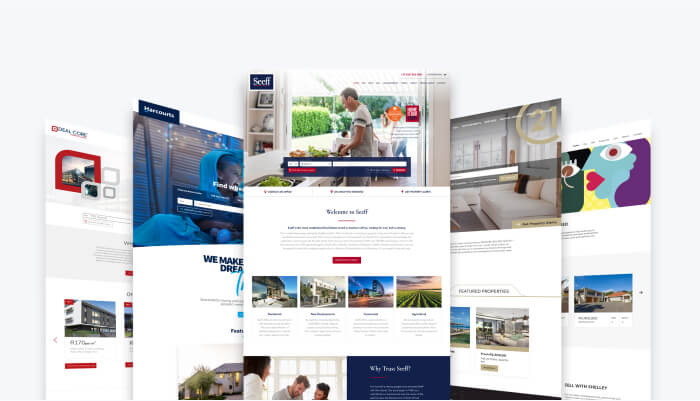
Have you ever landed on a real estate website and instantly felt at home? That sense of trust of being in the right place, where properties come alive, images leap off the page, and decisions feel simpler? That's the magic of a well-crafted real estate website. It resonates, informs, and guides clients effortlessly through their property journey. Here are examples of good real estate websites — both South African and international — that stand out from the crowd to inspire your own design.
Seeff Property Group: This website greets you with heartwarming visuals of families cosily nestled at home. The blue-and-white colour palette peppered with pops of red is true to their brand. The design is also easy to navigate through.
Savills: Savills’ client friendliness is clear as soon as you land on the home page — “How can we help you?”. The navigation works beautifully, allowing you to move between locations with ease.
Century 21 South Africa: "Don’t settle for average" immediately grabs you on the home page and the theme continues with actionable copy across the website. The company's bold approach to real estate also comes through in striking visuals.
Compass: Clients want value. Compass highlights this on their website with "Compass Concierge". The unique service (they front home improvement costs) immediately helps them stand out in a sea of agencies.
Chas Everitt International Property Group: Here, the art of simplicity in web design shines. Their straightforward call-to-actions like "find your dream home", "let the search begin", and "do the math" are descriptive yet manage to draw you in, urging you to engage.
Drumelia Real Estate: This website won Best Real Estate Agency Website in Spain 2023-2024 at the International Property Awards. It’s not hard to see why. Attention to detail shows in every part from the striking visuals, smooth transitions, down to the cohesive outfit colour scheme on their staff photo.
Harcourts South Africa: Social proof is a powerful motivator and this website puts it clearly with a statistic: "our clients consistently rate us an average of 4.7 out of 5 stars". It's an instant trust builder.
Fuller Group: This luxury real estate brand knows its audience. The website has upmarket visuals but it’s the emotive video by realtor Bo Fuller that sells the enticing lifestyle they offer clients.
Shelley Residential: Shelley Residential has chosen a colourful palette to show they're redefining real estate. Beyond that, they also highlight their community ties and engagement. Their SPCA page is a masterclass in storytelling and beautifully highlights the details behind their partnership and campaign.
CBRE: Recruitment can be an afterthought on some real estate websites. Not this one. CBRE’s dedicated page shows why they’re a sought-after workplace, highlighting career paths, current employee stories, work benefits, and employer accolades.
Lambie Spark & Associates: Browsing through their site is a breeze, whether you're on mobile or desktop. The responsive design ensures you get a seamless experience as you search for properties, read the latest news, or get in touch.
Colliers: Knowledge helps clients make informed decisions. True to the agency’s values, the website provides a wealth of “news, insights, and trends”. The news ticker, a nice touch, showcases properties, case studies, podcasts, and insights on a loop.
Deal Core Property Group: Right at the top, the 'Contact Us' tab is hard to miss. But what really makes you feel valued is the live chat facility that welcomes you immediately. It's a reassuring nod to customer service and accessibility.
JLL: The real estate process can be overwhelming and poor websites tend to be cluttered. Instead, JLL keeps everything tidy and easy to navigate with exceptional use of white space.
Plumari Property Group: It’s easy to see why this is one of the best property websites around. This brand remains approachable but still professional. From the second-person copy that speaks directly to you, the clean design with plenty of white space, to the dynamic layout as you scroll down the home page, there’s a lot to love.
A well-designed and functional website can be a game-changer, setting you apart in a competitive market. These websites have been designed using best practices and can inspire how your website looks and functions. The most important part is to put the needs of your client first and create an experience that helps them achieve their goals.

Put yourself in the shoes of your client for a second. Searching for property or real estate services online and finding hundreds of companies can be daunting. Some will go with pricing. Some will trust in established brand names. And some will make snap judgments based on your website.
As your website is often the first point of contact for potential clients, getting it right is crucial. For that, the design process is one step you invest in. Whether you're revamping an existing site or starting from scratch, here are some key design tips tailored just for you.
Have a user-friendly layout: Your website’s purpose and journey should be clear the moment a user lands on your home page (or any other page for that matter). It should be easy to navigate and have information clearly displayed so they can find what they need. An experienced real estate website designer can guide you in putting together a layout according to best practices.
Keep communications clear: Your website copy should be direct, speak to your audience in their tone of voice, and provide information in a short and simple way. Complicated language can get in the way of website visitors understanding your services or navigating your website.
Use high-quality images: Compelling visuals are important in any business website but particularly in real estate. They help communicate your real estate focus, show off your services, engage website visitors, and spark emotional connections. Invest in professional photography or use authentic feeling, high-resolution stock images in your design. All images should be used impactfully and compressed so they don’t affect page load times.
Engage with interactive elements: Adding elements like sliders, videos, or infographics can make static pages feel full of life and increase engagement. They can also make your website feel more personal, but care should be taken to use them sparingly.
Ensure readability: The best real estate agency or brokerage websites use fonts and colours that are easy to read and maintain a good contrast ratio. Readability has a direct effect on how website views absorb and understand your content.
Prioritise mobile responsiveness: Make sure your site looks and functions well on all devices including mobile ones. Many users will be browsing on their phones or tablets so you want to ensure your website’s design and experience translates well onto screens of any size.
Bring in the right features: When structuring your website, ensure you consider your client needs and cater to their goals. Here are some features and pages to include:
Create clear calls to action (CTA): Whether it's "Contact Us", "View Listings”, or "Schedule a Viewing", make sure your CTAs are visible and compelling. This will help guide your visitors to making a decision as part of their client journey.
Stay consistent throughout: Keep fonts, colours, and design elements consistent throughout your site for a cohesive look and feel. Besides maintaining the value of your brand, it will give your website users a positive experience.
Test and iterate: Once your website is live, continually test different elements (like CTA buttons or images) and make improvements based on feedback and analytics.
Besides making a good first impression, your website is an important part of your marketing toolkit. Considering the user journey and using the right design and content is vital. The result is a platform that reflects the expertise and the quality of service you provide in the real estate industry.

Whether you're looking to showcase your brand, share insights, or sell services, driving more traffic is a goal all real estate website owners share. But, as time passes you might find you’re only getting a handful of visitors. It happens! There's no one-size-fits-all approach, but there are tried-and-true methods you can use that can significantly boost those visitor numbers.
Search Engine Optimisation (SEO): By optimising your website and content, you can rank higher in search engine results pages (SERPs). There are several SEO strategies you can use:
Responsive website: As traffic increasingly comes from mobile visitors, it’s important to have a website that is responsive. If visitors are able to comfortably view your website and access features, it can ensure your website gets repeat viewings.
Content creation: Publish high-quality, relevant, and original content that adds value to your audience. If you do it regularly, you’ll build up your website’s presence as an authority in your area of specialisation and cement your name as an industry leader.
Social media marketing: Share content and engage with followers on platforms like Facebook, Twitter, LinkedIn, Instagram, and YouTube. At the very least, all your content should have share buttons so website visitors can expose you to audiences on these platforms.
Digital advertising: Create adverts that drive traffic from platforms like Google and social media sites. Today, these are hyper-targeted and come in a range of formats that can attract a specific audience and draw them to your website. Using retargeting strategies with platforms like Flow can also nudge visitors to your website to return if they didn’t convert the first time.
Email marketing: Send newsletters, property email alerts, promotions, and updates to a list of interested subscribers. Besides audiences being receptive to email marketing, you can easily segment your database to send tailored emails that will appeal directly to them.
Website analytics: Use tools like Google Analytics to monitor your traffic sources and adjust strategies accordingly. Google Search Console is helpful to find queries leading people to your website and help you rework content and create fresh pieces that appeal to the needs of potential website visitors.
Press outreach: Publishing a press release, getting a press feature, or being interviewed on TV or radio can improve your credibility and brand awareness. A link or mention of your website can give it a significant boost depending on the audience.
Guest blogging: If you write posts for other reputable websites in your niche and include backlinks to your site, you can drive traffic to your website. Many newspapers and websites even accept articles and feature you in paid advertorials.
Online communities: To spread your reach, participate in forums, discussion boards, or groups related to your industry or niche. By including your website in your profile (if applicable), you can get people interested in your website as you respond to questions and comments.
Influencer collaborations: Your property practitioners can nurture huge followings on their own. However, you can also tap into the followers of social media influencers or bloggers in your industry. With a partnership, you can create content that brings eyeballs to your website.
Referral traffic: There are plenty of ways to gain backlinks from other reputable websites. A simple way is to approach another website that has a content piece where your website and content could be linked to in exchange for a link to your own website.
Webinars and conferences: Network and promote your website in person or virtually. The right event can help you build your name and be a good opportunity to drop your website, whether in a speech, conversation, or on a business card.
Contests and giveaways: Who can resist winning a prize? This old-school method still works wonders to quickly draw attention and encourage shares and visits. A press and social media tie-in can even create a buzz on alternative platforms.
User-generated content: People trust the opinions and insights of other people. By encouraging users to create positive content related to your brand or products and linking back to your website, you can get more people to look into what you have to offer.
Joint collaborations: Partnering with other businesses or organisations that have a relevant audience can be helpful. For example, doing a promotion with a decor company can leverage each other’s real estate-minded audiences.
More traffic to your website means more opportunities to promote your listings and sell your services. These strategies can help you get the traffic you need but it does take time, determination, and a financial commitment in some cases. However, the rewards you reap can make the investment worth it!
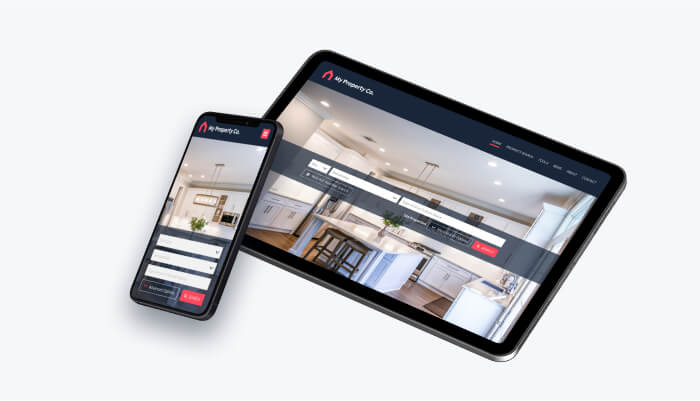
With Prop Data, you can create your own website with a proven feature set and an unrivalled performance record. Our award-winning websites are designed to help you find success with your prospective buyers, sellers, landlords, and tenants.
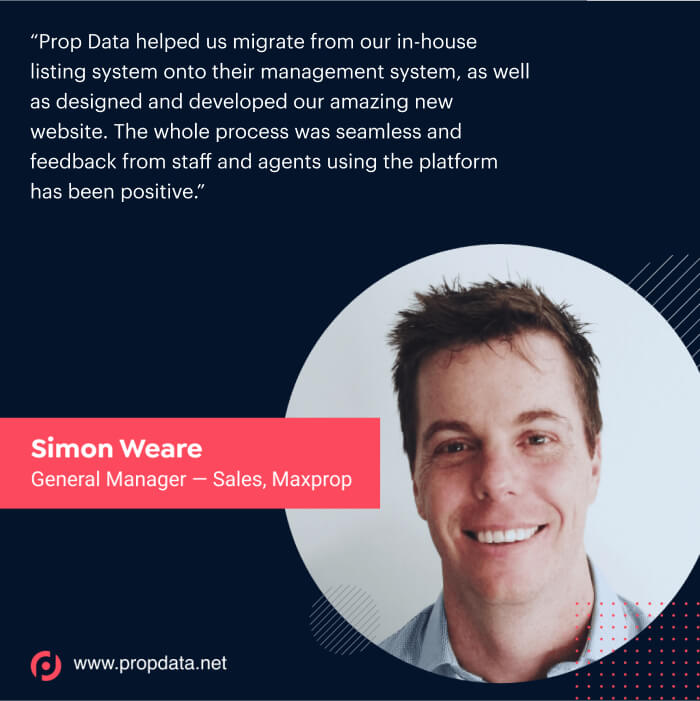
Copyright © 2025 Prop Data (Pty) Ltd Privacy Policy